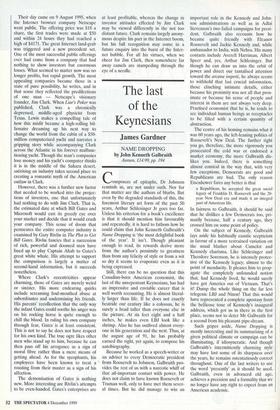The last of the Keynesians
James Gardner NAME DROPPING by John Kenneth Galbraith Aurum, £14.99, pp. 194 Composers of epitaphs, Dr Johnson reminds us, are not under oath. Nor for that matter are the authors of blurbs. But even by the degraded standards of this, the foremost literary art form of the past 50 years, Arthur Schlesinger Jr goes too far. Unless his criterion for a book's excellence is that it should mention him favourably and repeatedly, it is hard to fathom how he could claim that John Kenneth Galbraith's Name Dropping is `the most delightful book of the year'. It isn't. Though pleasant enough to read, its rewards derive more from the author's proximity to greatness than from any felicity of style or from a wit so dry it seems to evaporate even as it is being expressed.
Still, there can be no question that this Canadian-born American economist, the last of the unrepentant Keynesians, has had an impressive and enviable career that is well worth recounting. He is almost literal- ly larger than life. If he does not exactly bestride our century like a colossus, he is surely a head taller than everyone else in the picture. At six feet eight and a half inches, he makes even LBJ look like a shrimp. Also he has outlived almost every- one in his generation and the next. Thus, at the august age of 91, he has probably earned the right, yet again, to compose his autobiography.
Because he worked as a speech-writer or an adviser to every Democratic president from Roosevelt to Johnson, Galbraith pro- vides the rest of us with a narcotic whiff of that all-important contact with power. He does not claim to have known Roosevelt or Truman well, only to have met them sever- al times. But he did manage to win an
important role in the Kennedy and John- son administrations as well as in Adlai Stevenson's two failed campaigns for presi- dent. Galbraith also recounts how he became quite, friendly with Eleanor Roosevelt and Jackie Kennedy and, while ambassador to India, with Nehru. His many contacts include Averell Harriman, Albert Speer and, yes, Arthur Schlesinger. But though he can draw us into the orbit of power and direct our tantalised attention toward the arcana imperil, he always seems to withhold that last crucial information, those clinching intimate details, either because his proximity was not all that prox- imate or because his sense of people and interest in them are not always very deep. Practised economist that he is, he tends to see individual human beings as receptacles to be filled with a certain quantity of abstraction.
The centre of his homing remains what it was 60 years ago, the left-leaning politics of Roosevelt's New Deal. The further right you go, therefore, the more vigorously you prosecuted the cold war or endorsed a market economy, the more Galbraith dis- likes you. Indeed, there is something almost comical in the way that, with very few exceptions, Democrats are good and Republicans are bad. The only reason Eisenhower fares any better is that a Republican, he accepted the great social legacy of Franklin D. Roosevelt and the 20- year New Deal era and made it an integral part of American life.
In fairness to Galbraith, it should be said that he dislikes a few Democrats too, pri- marily because, half a century ago, they crossed him on some point of policy.
On the subject of Kennedy, Galbraith lays aside his habitually caustic scepticism in favour of a more restrained variation on the usual blather about Camelot and Kennedy charisma. Like Schlesinger and Theodore Sorenson, he is intensely protec- tive of the Kennedy legacy, almost to the point of mendacity. It pleases him to prop- agate the completely unfounded notion that, had Kennedy lived, he would surely have got America out of Vietnam. That's it! Dump the whole thing on the far less telegenic LBJ and Nixon! That this would have represented a complete apostasy from the bellicose tone of Kennedy's inaugural address, which got us in there in the first place, seems not to deter Mr Galbraith for a second from his pleasant pipe-dream.
Such gripes aside, Name Dropping is mostly interesting and its summarising of a given political climate or campaign can be illuminating, if idiosyncratic. And though Galbraith's intermittently charming style may have lost some of its sharpness over the years, he remains ostentatiously correct throughout. One of the last writers to use the word 'presently' as it should be used, Galbraith, even in advanced old age, achieves a precision and a formality that we no longer have any right to expect from an American academic.


















































































 Previous page
Previous page